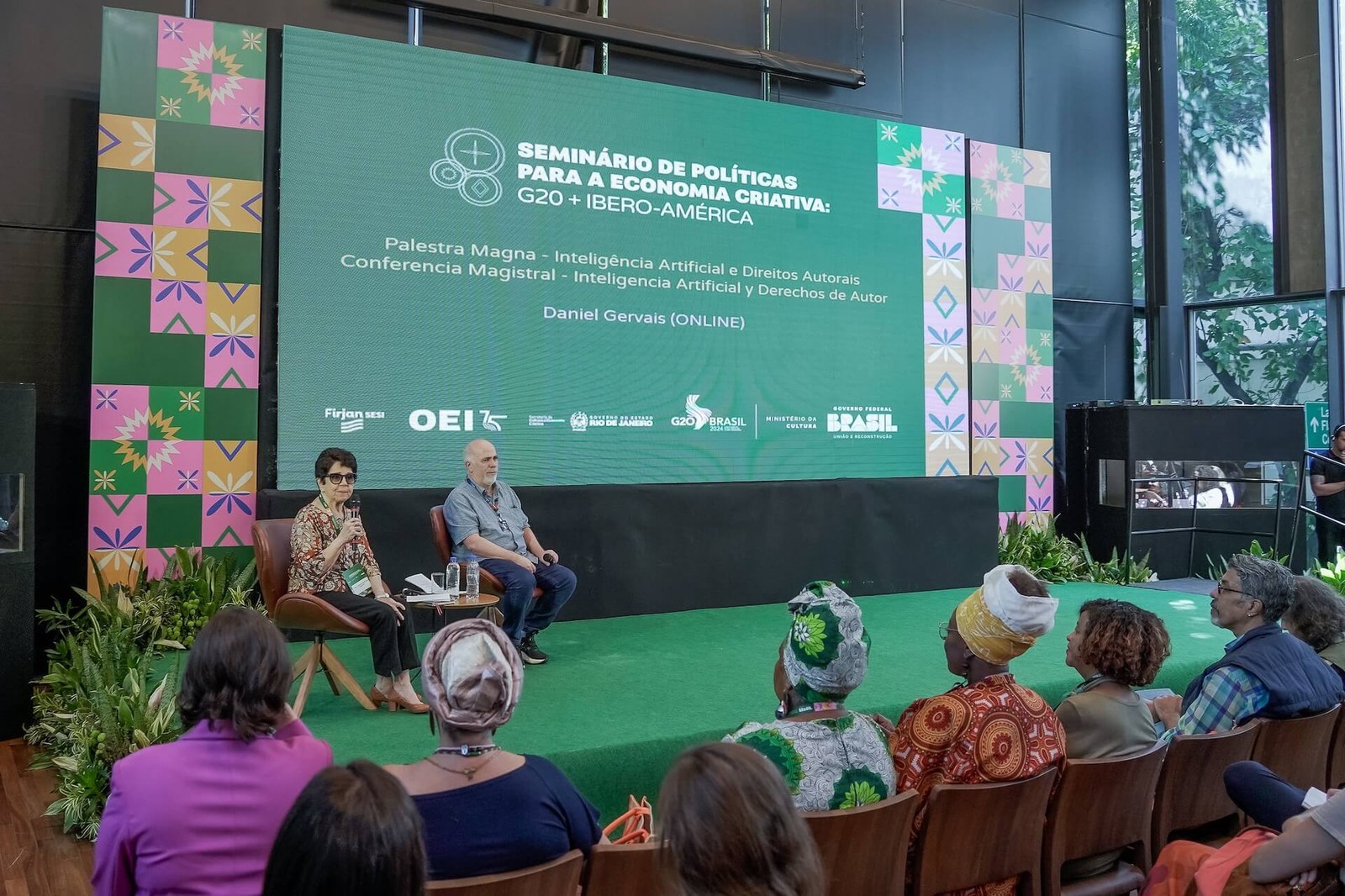“I am not surprized by the wonderful contents the machines can produce because they have learned from us,” says expert during G20 side event
“International Seminar on Policies for the Creative Economy: G20 + Ibero-America” gives continuity to discussions from the final technical meeting of the Culture Working Group in Rio de Janeiro. Artificial intelligence and copyrights were the themes of this Thursday’s (8) keynote lecture at Casa Firjan.

Artificial Intelligence (AI) and culture are two themes that intertwine in various aspects. They are among the main topics related to contemporary artists’ copyright. The topic was featured in a keynote lecture this Thursday (8) at the “International Seminar on Policies for the Creative Economy: G20 + Ibero-America”, an event parallel to the G20 organized in collaboration with the Organization of Ibero-American States (OEI).
The guest speaker, Daniel Gervais is the director of the Intellectual Property Program at the Vanderbilt University’s School of Law (United States). In dealing with AI in a broader sense, he presented aspects that both undermine artistic recognition and collaborate with the production of the human arts. “The machines need not be stopped, but we do need to think of all the factors entailed,” he explained.
“I am not surprized by the wonderful contents the machines can produce because they have learned from us. However, this is the first time in history that technological advances have led us to think about substituting the people we admire, those who create music and books, who write articles that change the way we see the world. What is happening is something else."
The discussions focused on the impossibility of machine creativity in the sense of their ability for inventions and for sensitivity and subjectivity in their contents. “One aspect to be considered in the production or interpretation is that reading a book or listening to a song may be fantastic to us, humans, but for the machines, these are mere data. A plane accident in reality or in a videogame, for the machine, is mere data. It cannot differentiate pain or individuals,” explained the author of the book “Forever: A Legal Sci-Fi Story”.
“I am not surprized by the wonderful contents the machines can produce because they have learned from us. However, this is the first time in history that technological advances have led us to think about substituting the people we admire, those who create music and books, who write articles that change the way we see the world. What is happening is something else,” warned the expert, stressing the importance of instituting legislation regarding the issue.
The discussion acknowledged that laws can only regulate human behavior, as “one cannot guide a bird on where to fly or a machine on how to operate.” Therefore, the focus must be on the individuals who create and operate these machines, as well as the companies developing artificial intelligence. In this context, Marcos de Souza, the Secretary of Copywriting and Intellectual Rights at Brasil’s Ministry of Culture, emphasized the importance of shaping these laws on an international level, particularly through the G20 platform.
Artificial intelligence regulation primarily operates at the national level, but it also demands a multilateral approach. Without internationally binding rules, activities like data mining and model training can occur abroad, potentially bypassing compensation or respect for national copyright laws. This lack of uniformity could lead to scenarios where Brazilian cultural heritage, for instance, is exploited outside of Brasil without providing any benefits to its rightful owners,” explained the Master in Anthropology.
The Seminar is a side event that collaborates with the program of the G20 Culture Working Group’s second technical meeting, which is taking place in the city of Rio de Janeiro. The theme of artificial intelligence touches upon other G20 groups, such as the Digital Economy WG. The discussions contemplate the issues of AI for social equity and sustainable development.
The Stance of the Brazilian Government
The Brazilian Government is attentive to the issue. Under the slogan "AI for the Good of All," Brazil launched the proposal for the Brazilian Artificial Intelligence Plan (Plano Brasileiro de Inteligência Artificial) this year, which includes investments of approximately 4 billion dollars. The document was developed by experts and scientists from 117 public, private, and civil society organizations across the country.
Moreover, during his participation at the G7 Summit, the President of the Republic, Luiz Inácio Lula da Silva, called attention to the concentration of data in the hands of a small number of individuals and companies, which is even more accentuated in the development of artificial intelligence, the benefits of which must be shared among all. “We are interested in safe, transparent, and emancipatory AI, one that respects human rights, protects personal data, and promotes information integrity; that enhances the capabilities of States to adopt public policies for the environment and that contributes to the energy transition,” stated Lula on the occasion.